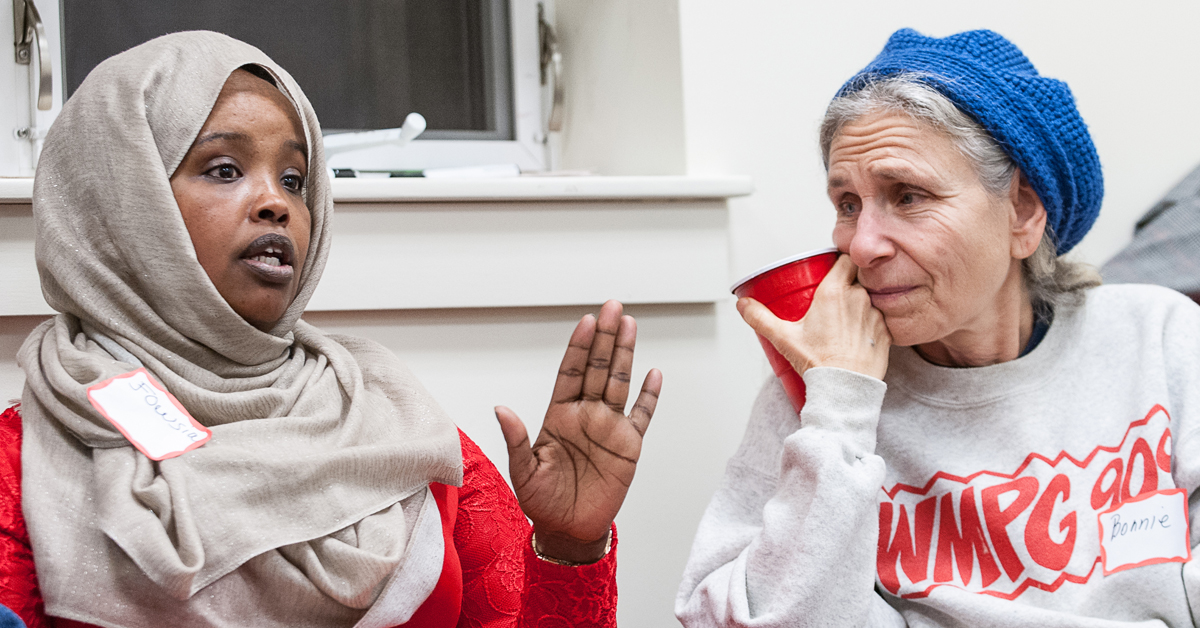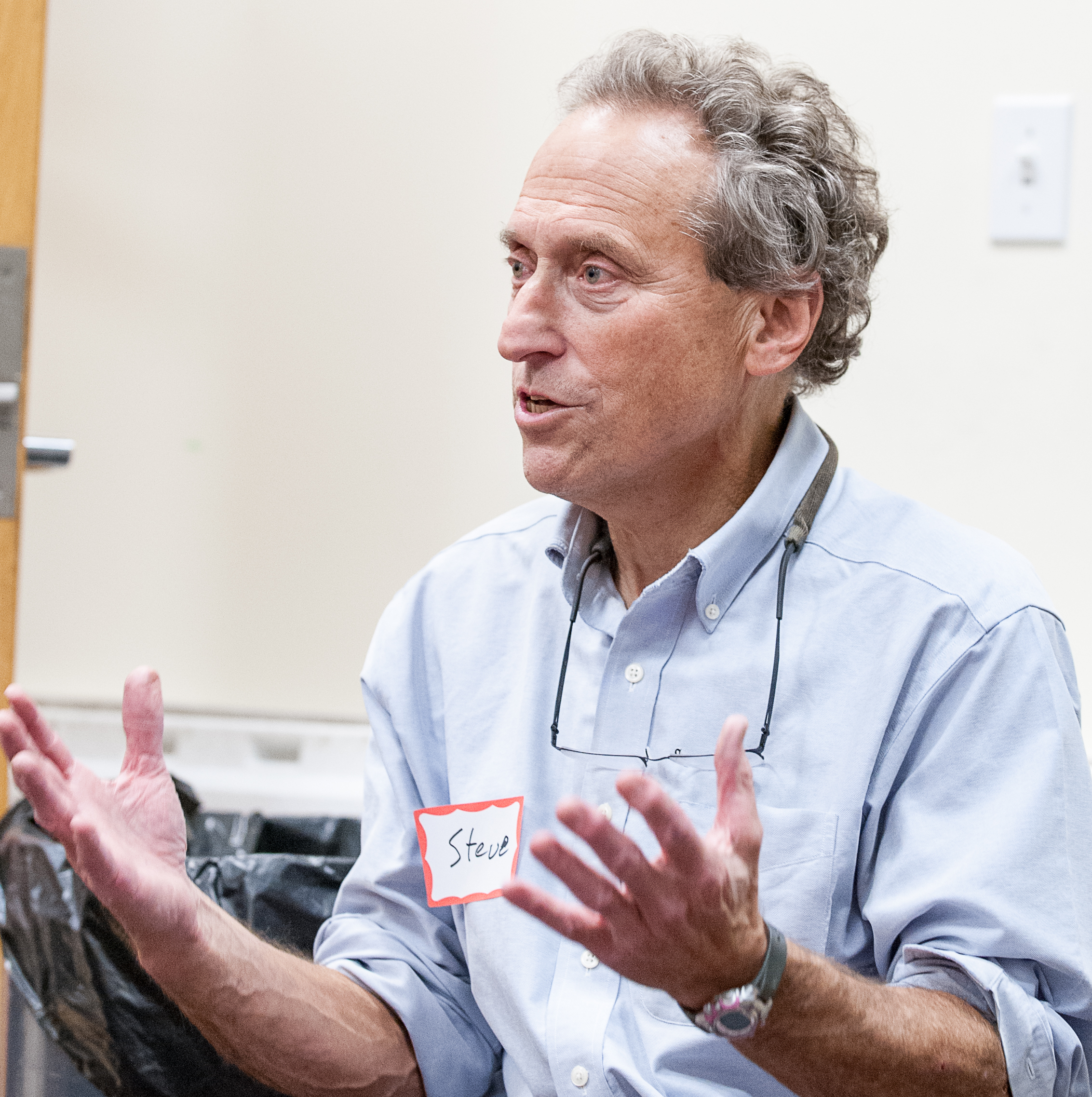
LEWISTON — A group of 20 people in the B Street Community Center on Tuesday night shared stereotypes they’ve heard about immigrants:
“Greedy.”
“Living off welfare.”
“They’ll take our jobs.”
“They’re lazy.”
“Dirty.”
“They’re terrorists.”
Leading the Community Conversation group was human rights educator and advocate Steve Wessler, who has led such groups in recent months. He asked the group to react.
A white woman said immigrants she knows “work seven days a week. They’re the most entrepreneurial people I’ve met.”
Immigrants do not come for welfare, Fowsia Musse and Abdi Abdalla said. “The phrase ‘they’re taking our jobs’ contradicts ‘they’re on welfare.’”
“We moved here for the low crime,” agreed Fowsia Musse. “Everything is walkable. It’s peaceful. It’s family-oriented.”
Amber Eliason, MacMahon Elementary School principal, said children from immigrant families work hard, and English Language Learner students have higher attendance rates and higher graduation rates than other groups.
Wessler listened and shared what research indicates: the same stereotypes have been used against the Irish and other groups who immigrated to the United States.
Research also shows how refugees contribute to the economy as taxpayers, that 10 to 20 years after refugees arrive, they’ve worked and saved enough money to buy their own homes, Wessler said.
Nearly 20 years ago when Somalis first came to Lewiston-Auburn, Wessler worked with community groups to reduce discrimination and promote understanding.
An incident in July 2006 when the head of a pig was rolled into the Lewiston Auburn Islamic Mosque on Lisbon Street in Lewiston — Muslims consider pigs to be impure — was followed by the Many and One demonstration and “things got significantly better because of the effort of a lot of people,” Wessler said. But in the past year since President Donald Trump was elected, hate acts and hate crimes have increased nationally.
“When leaders express bias it liberates people to express bias,” Wessler said. “That bias can escalate.”
One reason for the Community Conversation project is for new Mainers and long-time residents to get to know each other, to turn stereotypes into understanding and then share that knowledge.
When they hear an unkind or inaccurate comment about immigrants, whether it’s at work, in a store or holiday dinner, “all of us have the ability to talk about what we learned,” Wessler said. “Maybe you’ll remember somebody’s story. That’s what takes this from 20 people in this room to affecting more people.”
Intervention can be powerful, Wessler said.
He shared a story from nearly 20 years ago about a Somali girl and her mother in a laundromat. After the girl moved her clothes from the washer to the dryer, a white woman took the clothes out, and threw them on the muddy floor, kicking the clothes and yelling: ‘Go back to Somalia!’”
Another white woman intervene and helped the girl pick up the clothes and said, “‘Most of us aren’t like that,’” Wessler said. She said she was glad the Somalis have come, they’ve made Lewiston a better city. She used her own quarters for the girl’s laundry.
Wessler recalled the girl saying that the kind woman “‘healed my heart.'”
Saying or doing something when another is unjust is important, Wessler said. It gave the girl hope.
Wessler passed out recent examples of what bystanders said when they saw immigrants being insulted.
• A white person said, “They’re coming to get free stuff.” Another white person said, “No. They’re coming for community, safety and a home.”
• A white person waiting in line to pay for food overheard others talking. One man said, “The next thing you know they’re going to take over everything.” The clerk said, “I don’t have any problem with them.” The third person in line said, “Me neither. I don’t have a problem with them.”
• A woman started yelling at immigrant youth on the street, “Go back where you came from!” A man came out of a store and said, “You cannot talk to kids like that!”
One of the group members, Nate Miller, said it’s easy to think of immigrants “as ‘us and them’ because we’ve never had conversations.” When those conversations happen, “you realize we want the same things out of life.”
Somalia native Kheyro Jama said before she joined the group she didn’t know how to respond when she heard something negative. “Now I don’t have a problem saying, ‘It’s not like that.'”
Another thing she got from the group was the knowledge that she has similarities with whites. And, she added, she didn’t know “how they felt about me.” Many are glad she and others are here.
Jama said it gives her hope.
The Community Conversations project is a collaboration of the Maine People’s Resources Center, the Maine Council of Churches and Maine Community Integration.

Human rights educator and advocate Steve Wessler leads Tuesday’s Community Conversation at B Street Community Center in Lewiston. (Russ Dillingham/Sun Journal)
Comments are no longer available on this story